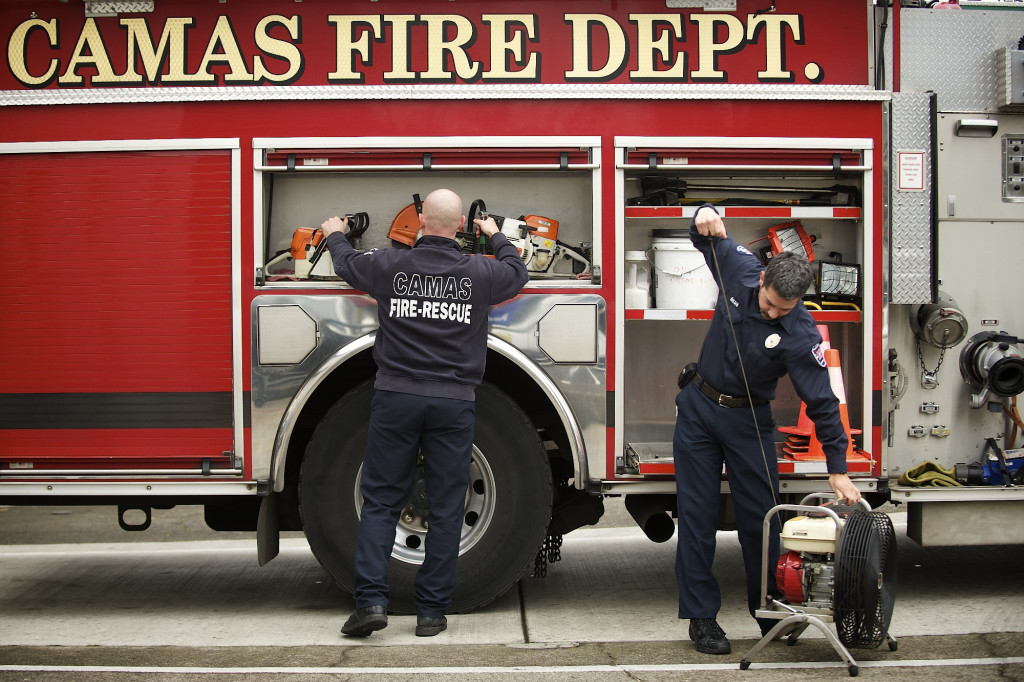The discussion between Camas and Washougal officials on how many new hires to make in the Camas-Washougal Fire Department continues after both city councils held their first meetings of the year.
Camas officials originally hoped to add four firefighters and a deputy fire marshal or fire inspector, and passed their 2019-2020 biennial budget with room for the five new positions. The department covers both cities, with Washougal paying Camas for its share of the department’s services every year based on a formula.
Then Washougal officials told Camas they don’t have the funds to pay their portion of the proposed new hires.
At their Dec. 7 workshop, Camas city councilors discussed hiring two new firefighters this year, plus a position in the fire marshal’s office, most likely a deputy fire marshal, according to Camas-Washougal Fire Chief Nick Swinhart. He said the discussion surrounding the fire marshal’s office hire was to have that person spend most of his or her time working in Camas, since Washougal wouldn’t be paying for a portion of the position.
“That doesn’t mean they won’t spend any time in Washougal, but they’ll primarily work in Camas,” Swinhart said.
The two new firefighters will work out of the Grass Valley Fire Station, Station 42, 4321 N.W. Parker St., Camas, Swinhart said. He added that the department will want to have the new firefighters on board by April 1, because that’s when the next fire academy starts.
Washougal councilors didn’t discuss the issue at their first January meeting, but City Manager David Scott anticipates an amendment to the interlocal agreement between the two cities will be in front of both councils in the coming weeks.
“We’re trying to find a path that is mutually acceptable, and I think we may have done that,” Scott said.
In 2017, Washougal paid Camas $3.06 million for fire services, Scott said. Washougal’s 2018 payment is expected to come in at around $3.3 million, and the city’s 2019 payment is an estimated $3.34 million without those new positions. The five new positions would have cost another $153,521 for Washougal, a figure that most likely would increase in 2020 when the new hires would be there for a full year, Scott said.
He added that Washougal’s portion of the two new hires, if both cities agree to that option, would be additional $64,000 on top of the estimated $3.34 million. Part of the reason Washougal officials are hesitant to look beyond 2019 is because the city’s current six-year levy lid lift expires in 2020.
“We can only look at next year right now,” Scott said. “We don’t have funding beyond next year for it, not to mention funding for additional positions. However, as we work through the details of an amendment to our existing interlocal agreement, we will be carving out a mutual path forward about how we will use this year to reach agreement on how we might move forward together in the program.”
Scott said that could mean turning to voters in 2020 to vote for a new levy lid lift to start in 2021 to bring in more funding for extra fire department staffers.
Camas city councilors have a workshop and regular meeting Tuesday, although no item relating to the fire department staffing issue was on the budget as of Friday afternoon. Washougal councilors are scheduled to hold their next workshop and regular meeting on Jan. 28. Scott said the two cities will continue to talk and work toward an agreement in hopes of getting it in front of each city council.
Swinhart said the agreement isn’t all that he hoped for, but is still welcome.
“It’s not ideal. It’s not exactly what we were looking for,” he said. “We will definitely put these personnel to good use. It will help lower overtime. It will help with our daily staffing.”




